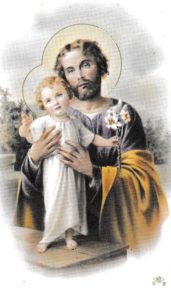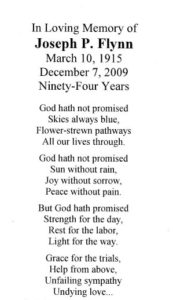Good Friday: Thinking of Mary…and Joe
My mother died on Good Friday. She was just one month shy of her 90th birthday. The year was 2003, and Good Friday fell on April 18th that year, but no matter. Every year since, on Good Friday, I think of her. And I think of my Uncle Joe, her brother, two years younger, who was her best friend—always there for her—her entire lifetime. There for her despite the fact that she married in 1939, and he joined the Navy in 1940, met his beloved Rosemary in 1941, and married her in 1943.
Mary and Ray, over the course of sixteen years became the parents of six children—my three sisters, two brothers, and me. Joe and Rosemary, in the early years of their marriage, lost two unborn babies, and were heartbroken to learn they would never be parents. And yet, they did become parents—a second set of parents—to the six of us. They came to our house every Saturday night, Rosemary always bringing each of us kids a package of M&Ms or Canada Mints; the two of them sat down with my parents to an evening of Canasta or Gin Rummy; we kids just watched TV. At bedtime, Aunt Rosemary would always come upstairs, tuck me in, and say, “Good night, God bless you.”
Joe and Rosemary were with us for every Christmas and Thanksgiving, every birthday, First Communion, Confirmation, many school plays, piano recitals, and (for the boys) Little League games. Every summer, my brother Richard and I would stay with them for a week or two. When my father died … in 1976… Joe and Rosemary continued to simply be there for my mother, for all of us, always.
Rosemary died in October of 2002. It was six months later, April 18, 2003, that my mother died. Good Friday that year. Joe, at that point, was 88 years old. He had seen his wife through a long and difficult illness. He was frail, still grieving (as he would be for the rest of his life). He had a heart condition, arthritis, bad knees. There would be a wake, a funeral, a luncheon afterwards. I sat with him in his apartment at the assisted living residence. “Joe,” I said. “You don’t have to go.”
He was quiet for a minute, “Oh, I do have to go,” he said. “If I didn’t go, I would feel I was letting Mary down.”
He went.
In the weeks and months that followed, we all worried about Uncle Joe. He was living alone for the first time in his life. He and Rosemary had been together, inseparable really, for nearly sixty years. He deemed it “a marriage made in heaven.” But Rosemary was gone. Now Mary was gone, too.
For a while he took his meals in his room. He thought about moving somewhere else. An apartment would be much cheaper. He didn’t need to stay in such an expensive place.
But then he rallied. “Rosemary picked this place,” he said. “She wanted me to be here.” And then almost under his breath, “She knew. She knew.” And then, “Well, I’m here, I’d better make the best of it.”
And so he returned to the dining room. A naturally, sociable guy, he stopped to say a kind word to just about everyone. He made small jokes with the staff, especially Bud who was in charge of maintenance: “Need a hand with that paint job?”
“Yeah, Joe, I have a brush for you,” Bud would reply.
Joe picked up the calendar of events from his mailbox and took part in everything—from bingo to seated calisthenics. (But not the craft projects. He drew the line at that.)
“The ladies” had invited him to join their after-dinner card games. “And if they get too gossipy,” he would say, “I just turn my hearing aid down.” He demonstrated how quickly this could be done, with his thumb to his ear and the flick of his wrist.
He signed up for all the outings. “I don’t know why the men around here don’t take advantage of these trips,” he would say.
He still drove his big gunboat of a car (within a radius of just a few miles). He went to Mass every Sunday. He drove himself to the barbershop, the pharmacy, the bank.
Mr. Penfire and I picked him up and brought him to family gatherings…or sometimes just on a drive to a local dairy farm that had an ice cream stand. We would ostensibly be going for an ice cream cone; then Joe would ask Mr. Penfire. “What are you having?”
Mr. Penfire would invariably say, “A sundae.”
Joe would act surprised, then say, “Well, if you’re having a Sundae, I guess I’ll have one, too.”
I took him to all his appointments. (Medical appointments become the careers of the elderly.) Mr. Penfire and I visited at least once a week…eventually settling into a routine of driving down every Sunday afternoon.
Always, we would find Joe in the library at a table just outside his apartment, working intently on a jigsaw puzzle. Beside him, similarly focused on the puzzle, would be his friend Ruth, widow of a high school principal. Both of them had lost their spouses since moving to Allerton House. I sensed that Joe liked Ruth and was comfortable in her company because she was a no-nonsense, practical woman who was not “gossipy” and clearly did not have designs on him, as some of the other women clearly did. (“Don’t tell them I have a double bed,” he would say with a grin.)
Every week, Joe would look up at us, smile broadly, and say, “Well, what a nice surprise!” and then after a pause, glancing at me, “I put all the mail out on the table for you to look at.” He would follow me into his apartment, where we would review every bill and “begging letter,” always from a convent, or monastery, or mission. “Oh send them $5,” he would say. “That (fill-in-the-blank) was so important to Rosemary.”
Meanwhile, Mr. Penfire would sit with Ruth and rearrange all the puzzle pieces that were jammed into the wrong spots.
Joe did well, as a widower, for six and a half years after Rosemary died. And then, a fall. And a broken hip. And a wheelchair. And a few months later, a stroke.
Uncle Joe died on December 7, 2009. My birthday. And Pearl Harbor Day.
 When you are responsible for planning a funeral, you are asked to choose an image and a prayer for the cards that are left beside the Guest Book for those who come to pay their respects. For Joe I chose the image of Saint Joseph, of course. The funeral director gave me a sheet of prayers and quotations. I thought I would have a hard time finding one that would be just right for Joe. But as it turned out, it was easy to zero in on the one that best exemplified the faith by which Joe had lived his life.
When you are responsible for planning a funeral, you are asked to choose an image and a prayer for the cards that are left beside the Guest Book for those who come to pay their respects. For Joe I chose the image of Saint Joseph, of course. The funeral director gave me a sheet of prayers and quotations. I thought I would have a hard time finding one that would be just right for Joe. But as it turned out, it was easy to zero in on the one that best exemplified the faith by which Joe had lived his life.
Last night, I woke up with my head full of worries. I knew that others were no doubt wrestling with their worries, too, during these unnervingly frightening days. Then I realized that today is Good Friday. The day (but not the date) my mother died. I decided to look back at the words I had written for the eulogy I delivered at Mary’s funeral: “My mother and father shared the same values, which they passed along to us by their example—hard work, self-reliance, uncompromising honesty, a strong sense of fairness, respect and tolerance for all people, and a true egalitarian spirit.”
 The values my parents lived by are no surprise. For they belonged to the Greatest Generation. As did Joe and Rosemary. All four of them—and millions of others—faced down the grinding struggles of the Great Depression, the fear and the heartache that were part of everyday life throughout World War II. Who ever would have guessed that our generation would come up against such struggles, such fears, such heartache?
The values my parents lived by are no surprise. For they belonged to the Greatest Generation. As did Joe and Rosemary. All four of them—and millions of others—faced down the grinding struggles of the Great Depression, the fear and the heartache that were part of everyday life throughout World War II. Who ever would have guessed that our generation would come up against such struggles, such fears, such heartache?
It’s now our turn to teach by our example. This morning I re-read that prayer I chose for Uncle Joe. In it, I found “strength for the day.” And so I decided to share it.